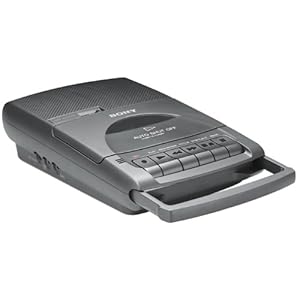Tuesday, November 15, 2011
Sony TCM-929 Pressman Desktop Cassette Recorder with Automatic Shut-Off
Price: $26.99
Click here to buy from Amazon
Monday, November 14, 2011
Royalty Free Music Clips & Software
Easily Mix Music To Front And Back Of Audio Files. Great Audio Information Products And Web Site Audio Buttons.
Check it out!
Saturday, November 12, 2011
How a Audio Engineering School Can Transform You From an Amateur to a Professional Sound Engineer
Audio Engineering is an elusive subject when taken seriously as a profession. As an amateur, people used to experiment on this field - making this a worthwhile hobby while they try to understand how sound actually works. Even you yourself may know of someone who either takes apart amplifiers or speakers or makes synthetic rhythms on their computer.
One explanation for the extensive "amateurization" of the audio engineering field is the availability of relatively less costly audio equipment being produced nowadays. Presently, increasingly able and complex computer programs that are designed to reproduce even more closely professional sound boards are made available and many types of sound equipment, like midi controllers, synthesizers and amplifiers can be utilized with virtually every laptop. But there's still a considerable difference between these amateur techniques and professional sound engineering, which is required for any kind of commercial sound-oriented enterprise. So if you want to make a career out of this, learn the skill first - this way, you can separate yourself from all the amateurs out there.
Making the Dream a Reality
There are obvious differences between tinkering and genuine commercial audio engineering. Some of the things that you can learn from a class are knowledge of communication and electronic standards, understanding of the physics behind sound as well as how sound waves are affected by electricity and distortions; but getting into classes that delve into those subjects with an audio engineering point-of-view could sometimes be challenging. Good thing that you have a lot of Minnesota Audio Engineering school choices, like IPR, Globe University, the AES and the University of Michigan.
If you want to have specific audio engineering classes, which are very helpful as a starting point, then you should go to the University of Michigan. If you like to avail of a radio broadcasting program that'll teach you the skills needed to land in a post in the radio industry, then Brown University is the one for you; still, you can gain Audio, MIDI, and Advanced Audio Production classes if you go to Globe University Minnesota School of Business.
For a broader range of opportunities, you may consider the IPR, or the Institute of Production and Recording, located in Minneapolis. The school's programs are all intended to help those who want to make it big in the music and audio industry; among the primary degrees that are being offered are Associate degrees in Media Arts with (1) emphasis in music and entertainment and (2) emphasis in audio production and engineering. Classes that tackle the business aspects of audio work and emerging technologies can also be taken. If you're interested, you may also consider the Audio Engineering Society, which has a chapter that covers Minnesota, Wisconsin, and Iowa. It may not be a Minnesota audio engineering school, but it is a great opportunity to have access to resources and mentors who can help you.
Minnesota Audio Engineering School from the Recording Connection offers one-on-one music recording and producing training in real recording studios.

